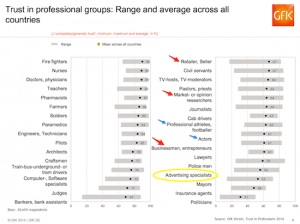
In recent discussions, I have found that there is a good deal of cynicism about the notion of branding. As companies continue to plough head and shoulder into the digital transformation ‘project’, the issue of company culture inevitably becomes front and central. As companies and brands look to “engage” with their customers to create “authentic experiences” and “meaningful connections,” I typically focus on two questions:
- what does the brand stand for, really?
- do the employees truly believe?
What does the brand stand for?
A brand is a signifier of the value of a product (or service) that makes it worth more than a comparable product. In more basic terms, a brand is the emotional baggage that surrounds the product. Taking the short cut, many brand marketers have rushed out to create “emotional” messages, viral videos and blogger outreach programs. However, the question is whether these efforts are properly rooted in the brand’s core DNA. In other words, to what extent are these communication efforts merely a function of the product manager or advertising agency of the moment? Some brands can make that work, in large part because there is vacuum at the heart of the brand. Many fashion brands and retailers have no particular or standout values, which is why, over time, they are likely to stub their toes if not experience greater setbacks as the transparency of the Internet and social media “out” such mountebanks. Brands that wield a powerful and charismatic owner/founder, who embodies the brand’s values, face the challenge come the time for incumbent to pass the reins. One needs only think of Jobs, Dell, Schultz… and who will be able to replace Bezos, Ellison and Branson? In order to survive over the long haul, those values must be wearable by the CEO and C-suite, as well as be felt and lived de facto by the largest number of employees.
Do the employees truly believe?
There is always a temptation for brands to hire consultants or pay their agencies top dollars to create mission and vision statements that are proudly printed in annual reports and/or displayed in lobbies and meeting rooms at headquarters. However, if the deeper work has not been done and those statements are not believed by employees, those brands will inevitably suffer over time. Why? Because it’s the employee who is on the front line, portraying, embodying and selling that brand and its products. In today’s world, there are five major areas where employees are customer-facing:
- sales teams
- stores (retail, eCommerce…)
- customer service
- social media
- and, last but not least, personally.

The Internet and social media have contributed in making these customer facing roles much more acute, transparent and important. For the first four instances listed above, the individual employee is the one who is providing that ‘above the call’ effort that makes the brand experience more worthwhile and memorable than some competitive brand. If all the advertising specialists (aka marketers) are considered only more trustworthy than politicians and insurance agents (i.e. the ones that always get you with the small print), per the GFK Trust by Professions 2014 study, the individual employee on the frontline must overcome a terrible amount of cynicism and mistrust in the eyes of the consumers. But, where word of mouth is most powerful is when it is delivered without the cloak of officialdom, at dinner tables, on personal telephone calls and potentially on one’s own private social media page. If the employee isn’t the brand’s #1 fan, then it is hard to believe that many customers will remain loyal, engaged fans. {Tweet this!} This belief underpins my baseline why branding gets personal.
The brand illusion
In a world where companies are pushed by shareholders or Private Equity owners (and the like) to maximize profits over a short timeframe, long-term branding and trust building efforts are easily cut from budgets and/or swept under the carpet. Company ethics count most for employees. They are the ones most likely to know and understand the validity of those ethics. However, over time in this increasingly transparent world, those ethics will be exposed. This can happen via sites like GlassDoor or ChooseMyCompany (France), it can happen through whistle blowers (VA Hospitals), or it can be just a question of time (e.g. GM’s massive Cobalt recall – read this damning NYT article). In today’s torrid pace, brand marketers need to take stock of the emptiness, the mistrust and skittishness of the consumer. The people running brands must find ways to insert a minimum level of purpose in their vision. Brand marketers need to let the more human side of the company surface. Not only will this play better among the employees over time, it will help create a more lively and animated personality for the brand in public spaces — such as in the store, via the salesperson or on social media pages. Ultimately, brands need not all have a 100%-vegan approach to purpose because that would be dogma and unhealthy (just like total transparency). However, given today’s perception of marketers, advertisers, celebrity spokespeople and businessmen (per the GFK study), brand marketers would do well to take heed of the rampant cynicism and firm up the brand’s core values. Otherwise, to quote the Imagination song, the brand it’s just an illusion…











Trackbacks/Pingbacks